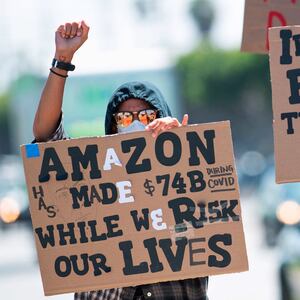Perry Connelly quickly noticed that something was off when he began working at the Amazon fulfillment center in Bessemer, Alabama, last spring. Managers were unfriendly to the point of not acknowledging employees when they walked past, and they were quick to write people up for infractions that seemed minuscule or made-up, such as too much time “off-task.”
“The main thing was just the disrespect,” the 58-year-old told The Daily Beast. Any concern, even one related to safety, went unattended unless it was an emergency, he said.
“And it’s like a constant push, push to do work,” said Connelly, who works in the stowing department, moving and scanning products. Sometimes, he’s forced to wait around for other departments to deliver products to him for scanning. “So they threaten to write you up,” he said. “Or they will write you up for things that are out of our control.”
So when he heard some of his coworkers wanted to unionize he was all for it. “With me, it was simple,” he said.
Nearly 6,000 workers at the Bessemer warehouse began a vote this week to determine whether they will become the first Amazon employees in the country to form a union.
But employees have described an ugly battle unfolding inside the warehouse, with Amazon using unethical, and in some cases legally dubious, tactics to get employees to vote “no.”
Amazon has long had a reputation for waging vicious anti-union campaigns and none of the company’s 100-plus warehouses in the U.S. has successfully unionized.
Last year the company briefly posted job ads for two analysts who would monitor unionization efforts. The positions were taken down and the company said they were a mistake. VICE reported that the company has monitored contractor Facebook groups and employee emails for signs of potential labor organizing.
Workers at an Amazon facility in Delaware voted “no” in a 2014 union election after the company hired an anti-union law firm to pressure workers. Amazon has hired the same law firm this time around—but, with protests for racial equality and better coronavirus precautions taking off in the past year, the climate is markedly different.

A sign at the Bessemer Warehouse greets employees as they come to work.
Supplied to The Daily BeastThe vote at the Bessemer warehouse, done via mail due to the pandemic, goes through the end of March. Workers are demanding better pay, better training and treatment, and a say in workplace negotiations.
If the majority vote “yes,” it has the potential to be the match to set off the kindling of Amazon employees across the country, many of whom are doing essential work under challenging conditions.
“We respect our employees’ right to join, form or not to join a labor union or other lawful organization of their own selection, without fear of retaliation, intimidation or harassment,” Amazon told The Daily Beast in a statement. The company said it offers “industry-leading” pay starting at $15/hr and places “enormous value” on having daily conversations with workers.
But Bessemer employees said there is little respect for employees’ rights—and in fact Amazon is actively attempting to influence the union vote.

Signs around the Bessemer warehouse.
Supplied to The Daily BeastJoseph Jones, a 35-year-old father who works in the fulfillment area on the weekends, said he felt the company was engaging in “bad faith arguments” to dissuade people from joining the union.
Jones shared photos with The Daily Beast of anti-union signs posted throughout the warehouse. “Unions can’t. We can!” one sign said. “Why pay for what you get for free?” read another sign.
Another sign simply told workers, “Vote no!”
Workers say they are obligated to go to mandatory weekly meetings where they are subject to anti-union PowerPoint presentations that are rampant with misinformation. (The company didn’t respond to specific questions about their anti-union campaign.)
Jones said he doesn’t think Amazon is inherently evil, but it’s not lost on him that the company has never bothered to hold mandatory weekly meetings on safety. “We don’t have mandatory meetings to go over, ‘Hey, how’s your mental health during this pandemic?’” he said. “But you better believe we’re gonna talk about how bad and how crazy the union is at these weekly meetings we have to go to.”
Workers reported receiving constant text messages with anti-union messages, and even seeing pressure-laden signs in the bathroom stalls. “Above the sinks… right beside the stalls,” Connelly said. “[The sign] will say, ‘Every vote counts.’ But then it’ll say, ‘Vote no.’”

Employees say they’re constantly bombarded with messages to vote “no.”
Supplied to The Daily BeastAnd the company set up the website, DoItWithoutDues.com, with a message on the homepage that says: “There’s so much MORE you can do for your career and your family without paying dues.” Linked pages have misleading information about union membership labeled as “fact.”
Amazon has been accused of firing workers in other cities who protested working conditions—a fear Connelly says is playing on Bessemer employees. Alabama is an at-will state, meaning employees can be fired at any time for almost any reason, but terminating an employee as a form of retaliation or because they are a union member is illegal.
“Some of the younger workers there, they are taking some... convincing [to join the union],” said Connelly. “They are being told they will be fired if they sign the registration forms about the union.”
Jones said the company is insisting that unionization would mean employees can no longer negotiate directly with managers. “There’s no negotiating currently,” he said. “So the fact that we would have someone negotiating on our behalf, how is that a bad thing?”
Amazon tried to block the mail-in vote, but the National Labor Relations Board denied their request last week. The Bessemer employees are organizing with the national Retail, Wholesale and Department Store Union (RWDSU).
“Amazon’s blatant disregard for the health and safety of its own workforce was demonstrated yet again by its insistence for an in-person election in the middle of the pandemic,” Stuart Appelbaum, president of RWDSU, said in a statement on Friday.
Just like the town of Bessemer, a large portion of the warehouse employees are Black.
“It’s significant that it’s a movement of primarily Black workers and women—the workers that have been most impacted by the pandemic,” Benjamin Sachs, a professor of labor and industry at Harvard Law School, told The Daily Beast.
A win at the Bessemer warehouse would be a “huge victory for economic and racial justice,” Sachs said, and workers with positive experiences with unions often go on to unionize other workplaces.
Connelly spent most of his career as an employee of the Lackawanna Leather Company, where he was part of a union. It gave him a reverence for what unions can accomplish. “That company worked like a charm as far as the union [was concerned],” Connelly said.
The pay was good at Lackawanna, but even better was the sense of respect that came with being part of a union. That’s what he says he wants at Amazon, where the pay of $15/hr is, according to some studies, not enough to support a family in most states.
Amazon told The Daily Beast that they already offer what the unions are requesting and that “direct engagement with our employees is a strong part of our work culture.”
But that direct engagement is what Bessemer workers say is lacking. Jones describes the fulfillment center as a “draining atmosphere” where employees get notifications via an app that their shifts have been changed with little notice.
“It’s not that we are asking for anything more than anyone else,” Connelly said. But he’s acutely aware that he and his coworkers are essential during the pandemic, and he thinks the way the company treats them doesn’t jive with that. “With Amazon being a billion dollar company, things should be a lot better than what it is,” he said.







